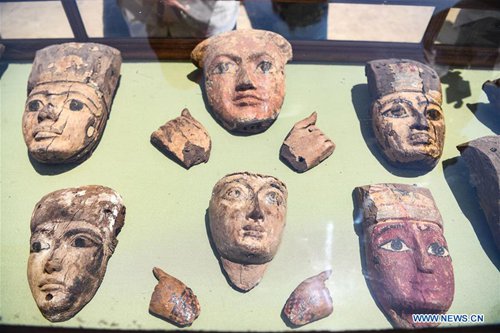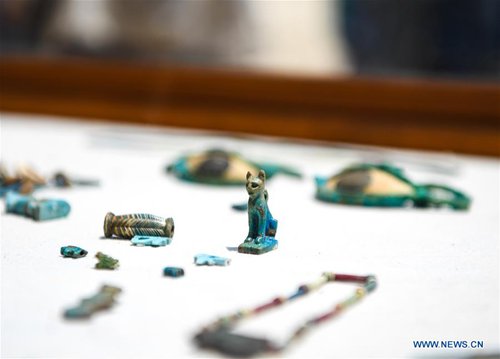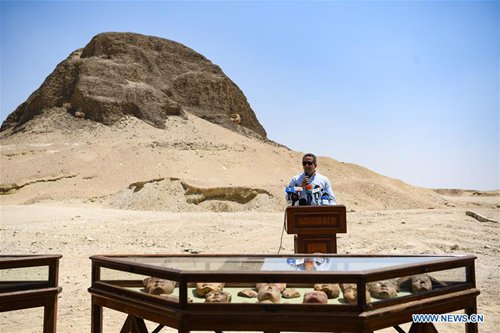Egyptian 4,000-year-old pyramid opened to visitors

Photo taken on June 28, 2019 shows relics unearthed from a tomb dating back to the Middle Kingdom era which is some 500 meters from the pyramid of Senusret II, the Pharaoh of the 12th Dynasty, in Faiyum, Egypt. Egyptian Minister of Antiquities Khaled al-Anany inaugurated on Friday the pyramid of Senusret II, the Pharaoh of the 12th Dynasty, marking its opening to visitors for the first time. Known as el-Lahun Pyramid, the royal cemetery dates back to the period between 1897 BC to 1878 BC and is located in Faiyum Governorate, 100 km southwest of the capital Cairo. (Xinhua/Li Yan)

Photo taken on June 28, 2019 shows relics unearthed from a tomb dating back to the Middle Kingdom era which is some 500 meters from the pyramid of Senusret II, the Pharaoh of the 12th Dynasty, in Faiyum, Egypt.(Xinhua/Li Yan)
Egyptian Minister of Antiquities Khaled al-Anany inaugurated on Friday the pyramid of Senusret II, the Pharaoh of the 12th Dynasty, marking its opening to visitors for the first time.
Known as el-Lahun Pyramid, the royal cemetery dates back to the period between 1897 BC to 1878 BC and is located in Faiyum Governorate, 100 km southwest of the capital Cairo.
"The pyramid was built from mud brick, but its core consists of stone walls that were infilled by mud brick. It had a length of 106 meters, a slope of about 42 degrees and a height of 48.65 meters," al-Anany said at a press conference.
The structure of the pyramid is supported by a natural rocky basement that carries a pyramid top and large limestone walls which provided support for the mud bricks, he added.
Discovered in 1889 by the British archaeologist William Petrie, the pyramid of Senusret II was built in this way to ensure the strength of the brick structure, said Mostafa Waziri, secretary-general of the Supreme Council of Antiquities.
While a pyramid temple is located on the east side, the entrance to the pyramid is on the south side.
Waziri said the entrance of a pyramid is often located at its north part for a religious reason because the ancient Egyptians believed the soul could only identify its dead body again from the north direction through the movement of stars.
However, the entrance of Senusret II pyramid was found at the south side for unknown reasons, he noted.
According to the Egyptian minister, there are two chambers and a sarcophagus of red granite without cover inside the pyramid.
But "the mummy of the king hasn't been found yet," he said.

Egyptian Minister of Antiquities Khaled al-Anany speaks at a press conference in Faiyum, Egypt, June 28, 2019.(Xinhua/Li Yan)

Photo taken on June 28, 2019 shows a relic unearthed from a tomb dating back to the Middle Kingdom era which is some 500 meters from the pyramid of Senusret II, the Pharaoh of the 12th Dynasty, in Faiyum, Egypt.(Xinhua/Li Yan)
The restoration work of the pyramid and its surrounding area started in August 2018 with the removal of debris found inside its corridors and burial chamber, installation of wooden stairs to facilitate its entrance, re-installation of the fallen stones in the hall and corridor to its original location, as well as restoring the deteriorated stones of its floor and installing a new lighting system.
Ashraf Sobhy, supervisor of the excavation work inside the pyramid, explained that the entrance of the pyramid is composed of a well under the tomb of a princess, not a built-in door as usual.
"The pyramid was built of mud bricks, because it represents prosperity and fertility for the ancient Egyptians," Sobhy told Xinhua.
This type of brick is also a symbol of the agricultural reforms which were adopted in the Middle Kingdom era and completed by King Senusret II, he said.
Some 500 meters from the newly opened pyramid, a tomb which dates back to the Middle Kingdom era was unveiled.
"The tomb is made of granite and contains a granite coffin. It is accessed through a 15-meter-deep pathway below the earth's surface," Waziri said.
In 1989, an attempt to open the tomb failed because of its depth and the existence of corridors.
Doaa al-Nashar, a restoration specialist, told Xinhua that some wooden masks perfectly carved for men were found inside the tomb, indicating that the ancient Egyptians believed the soul could return after death to the body wearing an artistic piece.